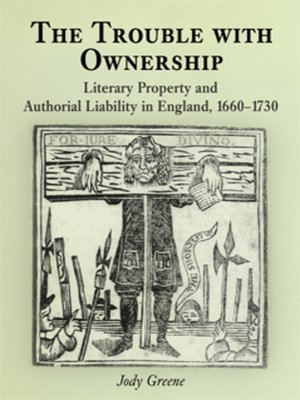The Trouble with Ownership
ebook ∣ Literary Property and Authorial Liability in England, 166-173 · Material Texts
By Jody Greene

Sign up to save your library
With an OverDrive account, you can save your favorite libraries for at-a-glance information about availability. Find out more about OverDrive accounts.
Find this title in Libby, the library reading app by OverDrive.



Search for a digital library with this title
Title found at these libraries:
| Library Name | Distance |
|---|---|
| Loading... |
Copyright and intellectual property issues are intricately woven into any written work, but the precise nature of this relationship has plagued authors, printers, and booksellers for centuries. What does it mean to own the products of our intellectual labors in our own time? And what was the meaning three centuries ago, when copyright laws were first put into place?
Jody Greene argues that while "owning" one's book is critical to the development of modern notions of authorship, studies of authorial property rights have in fact lost sight of the most critical valence of owning in early modern England: that is, owning up to or taking responsibility for one's work. Greene puts forth what she calls a "paranoid theory of copyright," under which literary property rights are a means of state regulation to assign responsibility for printed works, to identify one person who will step forward and claim the work in exchange for the right to reap the benefits of the literary marketplace. Blending research from legal, historical, and literary archives and drawing on the troubled authorial careers of figures such as Roger L'Estrange, Elizabeth Cellier, Daniel Defoe, John Gay, and Alexander Pope, The Trouble with Ownership looks to the literary culture of early modern England to reveal the intimate relationship between proprietary authorship and authorial liability.







